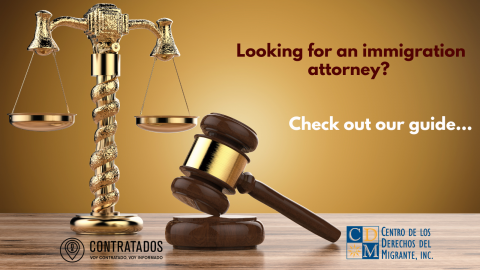June 5, 2025
Looking for an immigration attorney? Check out our guide.

In the United States, certain resources can help migrant workers facing challenges related to immigration. One resource that you might need at some point is an immigration lawyer. When choosing one, it’s important that you make the best choice for your case and avoid fraud. Keep in mind that every case is different, and a lawyer who worked for a friend or family member might not be the best option for your case.
How to choose a good immigration lawyer?
Know where to look. Consult with someone you trust. This could be with a friend, family, or an organization like CDM. Create a list of potential lawyers.
Request an initial consultation. Some offer free consultations, while others charge a fee. Remember to ask about costs when you request the consultation.
Get to know the lawyer. Talk to them and ask any questions you may have. For example: What types of immigration cases do they handle? What experience do they have with cases like yours?
Find out more about their experience. Ask if they are authorized to practice law and how long they have practiced immigration law. You can request their law license information and verify this information with the State Bar in the state that issued their license. You can also check if they have ever been disciplined for professional misconduct; the Bar usually posts this information on its website.
Watch out for red flags when choosing an attorney.
You need an attorney who will be honest about the potential outcomes of your case, whether positive or negative. Watch out if:
They don’t establish a written contract or legal services agreement with you.
They aren’t sensitive or sympathetic to your story or when you share sensitive information.
They keep your original documents, ask you to lie, or ask you to sign blank documents or forms.
They are evasive or don't answer all your questions and concerns.
They don't show you that they are licensed to practice law.
Their communication or response times are very long, or aren’t what you agreed to with them.
They claim that they have a relationship with the government or immigration and that they can speed up your case.
They are a notary public or advisor, not a lawyer. Notaries and advisors in the United States are NOT qualified to give legal advice or represent immigration cases and cannot practice law; only licensed attorneys or representatives accredited by the Department of Justice can do so. Relying on notaries or advisors could negatively affect your immigration case before USCIS or ICE.
I've chosen an attorney, now what?
Sign a service contract. This agreement sets out the work the attorney will do on your case, the fees you agreed upon, and method and dates of payment.
Gather important documents. Have all documents related to your case on hand, such as visas, passports, work permits, correspondence from USCIS or ICE (immigration), court documents, and any documents related to your entry into the U.S.
Be completely honest with your attorney. The information shared between client and attorney is confidential, meaning it is protected. You should be honest and share all the details about your immigration history and your time in the U.S., for example: the date you entered the country; how you entered; whether you have had any encounters with the police; whether you were ever detained or incarcerated; whether you have had any deportation orders; whether you have been in immigration court; the reason you left your home country; whether you are a survivor of any type of abuse, violence, or crime; and whether you were persecuted in your home country, among other details. Your attorney needs all of the relevant information so that they can work on your case.
Stay in touch. Ask how and when you can get in touch, what their response time is, and what information you should update if it changes (for example, your current address).
Remember that your attorney works for you and your case, so if you are not satisfied with their work, speak with them. If you cannot reach an agreement, review the fees and the agreement you signed with them, end the attorney-client relationship, and find a new attorney.
Signs that confirm you've chosen the right attorney:
They clearly explain the situation of your case and all the possible outcomes, and they answer all your questions calmly and clearly.
They sign a written service contract with you, setting out the work they will do in your case, their obligations, and your role in the process.
They are compassionate and supportive of the situation you are facing and your immigration history.
They make copies of your documents and return the originals to you.
Keep in mind:
USCIS forms are free and you should not pay for them, but submitting the forms usually has a cost.
USCIS does not accept cash payments, including those made through Western Union, PayPal, by phone, or by email. It never requires personal transfers.
Do not sign applications that contain false or blank information.
To report fraud, you can visit stopnotariofraud.org, report it to the Bureau of Consumer Protection, and seek help from an attorney for victims of notary fraud.
Remember that at CDM, we are not experts in immigration matters. To find an immigration attorney in your state, you can go this link: Immigration Law Help.
We are on Youtube and Facebook: visit us and join the fight.
